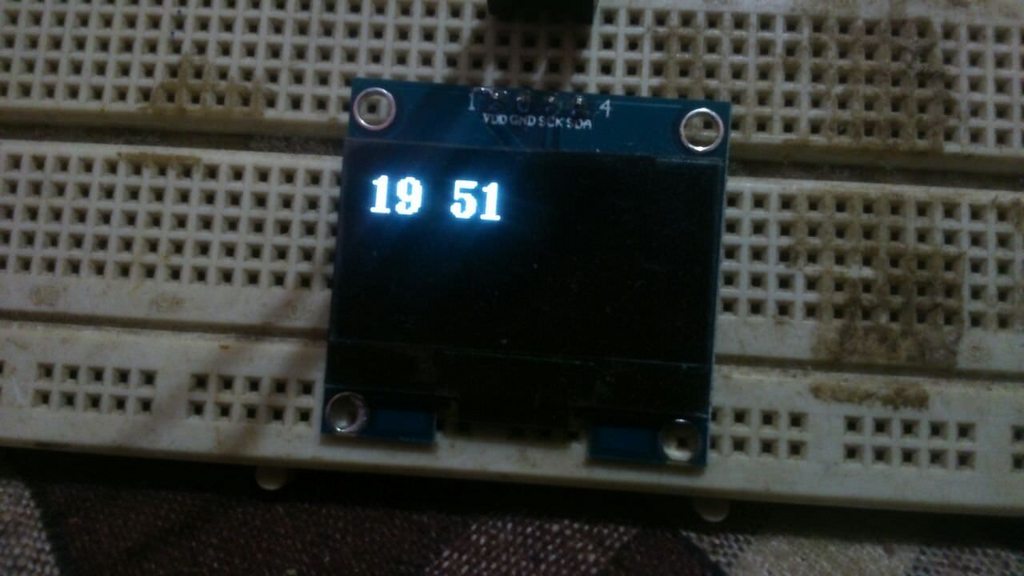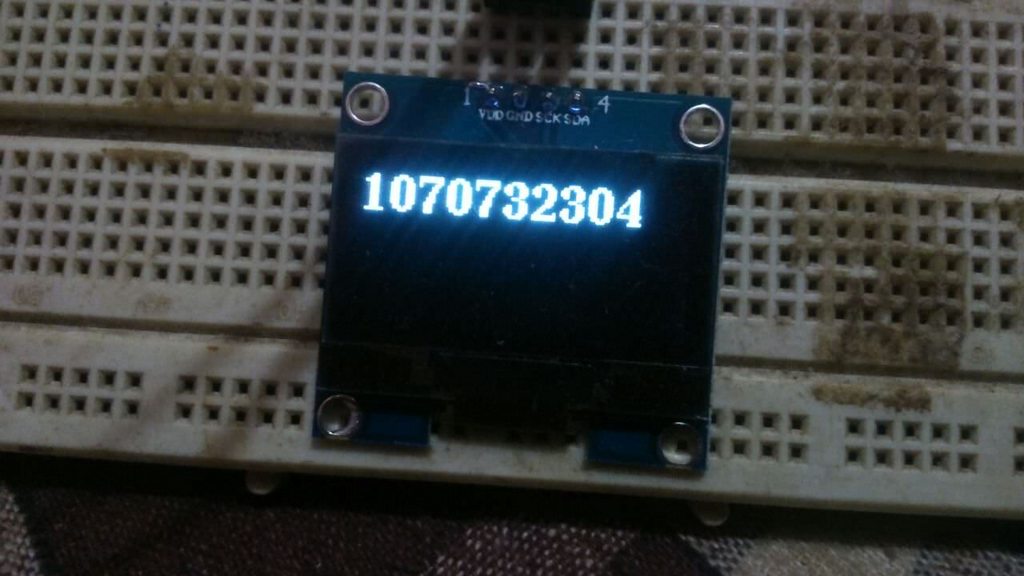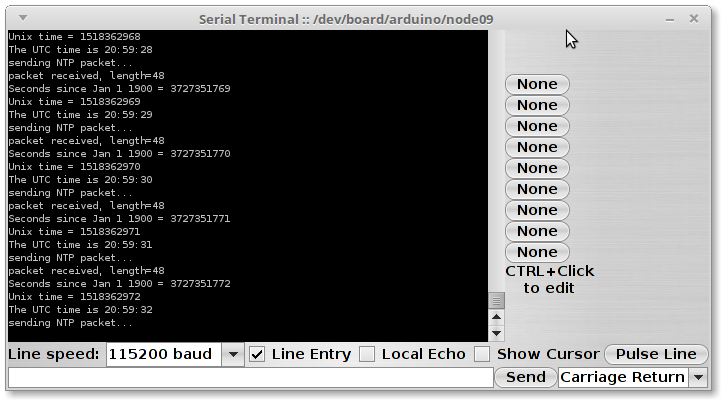So I have this code to get ntp time and display it on serial port. But I want to display it on a 1.30 inch I2C oled with a SH1106 controller using the U8G2 library. The only problem is I don't know the correct syntax. I have tried
Serial.print((epoch % 86400L) / 3600); // print the hour (86400 equals secs
per day)
int ho = ((epoch % 86400L) / 3600+9);
itoa(ho,hours,10);
u8g2.clearBuffer(); // clear the internal memory
u8g2.setFont(u8g2_font_ncenB14_tr); // choose a suitable font
u8g2.drawStr(0,20,hours);
and also
{
u8g2.setFont(u8g2_font_ncenB14_tr);
u8g2.firstPage();
do {
u8g2.setCursor(0, 20);
u8g2.print(hours,DEC);
u8g2.setCursor(33, 20);
u8g2.print(minutes,DEC);
}
while ( u8g2.nextPage() );
}
This is my code
//This is a code to display ntp time using Nodemcu
#include <ESP8266WiFi.h>
#include <WiFiUdp.h>
#include <Arduino.h>
#include <U8g2lib.h>
#ifdef U8X8_HAVE_HW_SPI
#include <SPI.h>
#endif
#ifdef U8X8_HAVE_HW_I2C
#include <Wire.h>
#endif
U8G2_SH1106_128X64_NONAME_1_HW_I2C u8g2(U8G2_R0, /* reset=*/U8X8_PIN_NONE);
char ssid[] = "123456"; // your network SSID (name)
char pass[] = "123456"; // your network password
//Your UTC Time Zone Differance India +5:30
char HH = 5;
char MM = 30;
unsigned int localPort = 2390; // local port to listen for UDP packets
//* Don't hardwire the IP address or we won't get the benefits of the pool.
//* Lookup the IP address for the host name instead */
//IPAddress timeServer(129, 6, 15, 28); // time.nist.gov NTP server
IPAddress timeServerIP; // time.nist.gov NTP server address
const char* ntpServerName = "time.nist.gov";
const int NTP_PACKET_SIZE = 48; // NTP time stamp is in the first 48 bytes
// of the message
byte packetBuffer[ NTP_PACKET_SIZE]; //buffer to hold incoming and outgoing
//packets
// A UDP instance to let us send and receive packets over UDP
WiFiUDP udp;
//SETUP
void setup()
{
Serial.begin(115200);
Serial.println();
Serial.println();
// We start by connecting to a WiFi network
Serial.print("Connecting to ");
Serial.println(ssid);
WiFi.mode(WIFI_STA);
WiFi.begin(ssid, pass);
while (WiFi.status() != WL_CONNECTED) {
delay(500);
Serial.print(".");
}
Serial.println("");
Serial.println("WiFi connected");
Serial.println("IP address: ");
Serial.println(WiFi.localIP());
Serial.println("Starting UDP");
udp.begin(localPort);
Serial.print("Local port: ");
Serial.println(udp.localPort());
}
// Send an NTP request to the time server at the given address
unsigned long sendNTPpacket(IPAddress& address)
{
Serial.println("sending NTP packet...");
// set all bytes in the buffer to 0
memset(packetBuffer, 0, NTP_PACKET_SIZE);
// Initialize values needed to form NTP request
// (see URL above for details on the packets)
packetBuffer[0] = 0b11100011; // LI, Version, Mode
packetBuffer[1] = 0; // Stratum, or type of clock
packetBuffer[2] = 6; // Polling Interval
packetBuffer[3] = 0xEC; // Peer Clock Precision
// 8 bytes of zero for Root Delay & Root Dispersion
packetBuffer[12] = 49;
packetBuffer[13] = 0x4E;
packetBuffer[14] = 49;
packetBuffer[15] = 52;
// all NTP fields have been given values, now
// you can send a packet requesting a timestamp:
udp.beginPacket(address, 123); //NTP requests are to port 123
udp.write(packetBuffer, NTP_PACKET_SIZE);
udp.endPacket();
u8g2.begin();
}
//LOOP
void loop()
{
char hours;
char minutes;
char seconds;
// get a random server from the pool
WiFi.hostByName(ntpServerName, timeServerIP);
sendNTPpacket(timeServerIP);
// send an NTP packet to a time server
// wait to see if a reply is available
delay(1000);
int cb = udp.parsePacket();
if (!cb) {
Serial.println("no packet yet");
}
else {
Serial.print("packet received, length=");
Serial.println(cb);
// We've received a packet, read the data from it
udp.read(packetBuffer, NTP_PACKET_SIZE); // read the packet into the buffer
//the timestamp starts at byte 40 of the received packet and is four bytes,
// or two words, long. First, esxtract the two words:
unsigned long highWord = word(packetBuffer[40], packetBuffer[41]);
unsigned long lowWord = word(packetBuffer[42], packetBuffer[43]);
// combine the four bytes (two words) into a long integer
// this is NTP time (seconds since Jan 1 1900):
unsigned long secsSince1900 = highWord << 16 | lowWord;
Serial.print("Seconds since Jan 1 1900 = " );
Serial.println(secsSince1900);
// now convert NTP time into everyday time:
Serial.print("Unix time = ");
// Unix time starts on Jan 1 1970. In seconds, that's 2208988800:
const unsigned long seventyYears = 2208988800UL;
// subtract seventy years:
unsigned long epoch = secsSince1900 - seventyYears;
// print Unix time:
Serial.println(epoch);
// print the hour, minute and second:
minutes = ((epoch % 3600) / 60);
minutes = minutes + MM; //Add UTC Time Zone
hours = (epoch % 86400L) / 3600;
if(minutes > 59)
{
hours = hours + HH + 1; //Add UTC Time Zone
minutes = minutes - 60;
}
else
{
hours = hours + HH;
}
Serial.print("The UTC time is "); // UTC is the time at Greenwich //Meridian (GMT)
Serial.print(hours,DEC); // print the hour (86400 equals secs per day)
Serial.print(':');
if ( minutes < 10 ) {
// In the first 10 minutes of each hour, we'll want a leading '0'
Serial.print('0');
}
Serial.print(minutes,DEC); // print the minute (3600 equals secs per minute)
Serial.print(':');
seconds = (epoch % 60);
if ( seconds < 10 ) {
// In the first 10 seconds of each minute, we'll want a leading '0'
Serial.print('0');
}
Serial.println(seconds,DEC); // print the second
}
// wait ten seconds before asking for the time again
delay(10000);
}
Adding the second block of code (print one) to the main code gives me correct time on the oled screen but only when the ntp receives a packet. Otherwise its some 10 digit number. How do I get rid of the number and keep displaying the time till it is update with a valid newer value. I have attached images of display.



